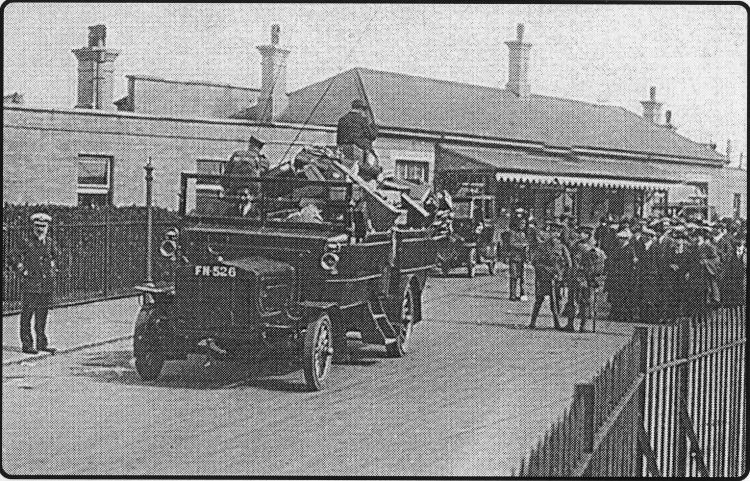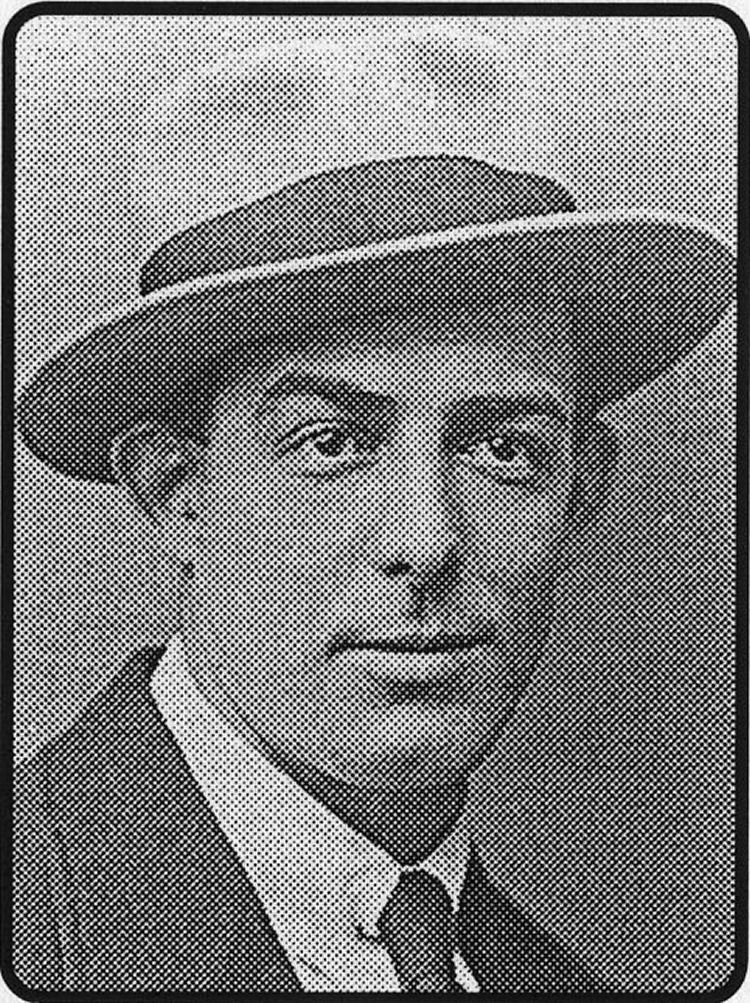
Published 10 May 2001
Photo quest

MEMORIES reader Derrick Lawson, of Lynwood, Folkestone, has been trying
without success to track down a photograph of the town's former Electricity
Works, at Morehall, where his grandfather, Joseph Radford Scowen, was a
chief inspector in the 1920s. Derrick's uncle. Bill George Scowen, also
worked for the company after being gassed in France in the First World War.
Ironically his job, for about five years, was stoking boiler fires at the
works. But he survived, reaching the grand age of 89.
The best Derrick can find is a family picture of his grandfather and uncle
in an Electricity Works outing group about to set off in one of the old
open-top charabancs in 1921.
Another of his uncles,
Perce Scowen came to Folkestone from Camberwell when Joseph Radford Scowen
landed his job at the Electricity Works, the site of \ which is now occupied
by a /builders' centre behind Station Road.
Back at the start of the First World War Perce's three brothers joined the
Services, but he got a job at Hawkinge airfield where he was employed for
many years, cycling from Cheriton to the village each day, rain or shine,
says Derrick.
"In the early 1930s my fam-
which is now known as Harbour Way." (Electric Cottages are now known as
Lawrence Way.)
Derrick went on to tell me that when they went to Morehall his Uncle Perce
would take him down the local toyshop at the corner of St Francis Avenue.
"That shop is now The Corner Place, a fish and chip shop. It was once owned
in the 1930s by a Miss Jacobs, always dressed in black but a very nice
woman.
"Uncle used to take me there and let me choose a toy. I used to look forward
to those shopping trips -because I usually got another treat from Miss
Jacobs, a bag of sweets!"
Derrick said his family later moved away, but he often wonders what happened
to Miss Jacobs.
"In 1932 my father Ernest was transferred to Portsmouth, so after that the
Folkestone trips stopped.
Perce Scowen, uncle of Derrick Lawson, ily lived at Dover as my father
worked for the old Southern Railway company and we used to come over to
Folkestone each weekend to visit my parents' parents.

"One weekend we stayed at Electric Cottages, More-hall, the next weekend we
stayed at Dover Street,
THIS Malthy-built charabanc of the late ‘Father’ Eric Wills, of Cheriton, is
pictured at Folkestone harbour in 1914 after being commandeered by the Army
to convey the luggage of German nationals to an internment camp. Peter
Wills’ picture was shown to me by Roy Humphreys, of Hawkinge, who knew I was
a motoring enthusiast.
TERENCE Gilham writes from 34 Westwood Road, East Peckham. Tonbridge TN12
5DF (01622 871698) hoping to trace details of Frances Kitney (nee Gilham) a
great aunt, and her husband Maurice Kitney who once worked in Hythe where he
was a coachman, living in the Lodge at Cannongate House, possibly home of
Mackeson, the brewer. He was born in Newington and Francis at Bishopsbourne.
"No trace of burials can be found at Hythe of them or of their three
children. It is as if they disappeared," says Mr Gilham. He told me hd has
heard from a grandson of a brother of Maurice, but he had no further
information to give.
except that we used to come back each Christmas.
"Uncle Perce used to build short wave radios at Electric Cottages.
"He worked on all the old planes at Hawkinge during the 30s until the
Spitfires and Hurricanes arrived.
"After my grandmother died, in 1935, grandfather and the family moved to
Geraldine Road nearby."
Derrick remembers that later they would visit his uncle and aunt Eva at
their home at Hawkinge and recalls vividly how, back in 1941 his uncle told
them about unexploded bombs that were often dropped on the airfield.
'"You mark my words, those bombs will cause a bit
of trouble when this war is over' he used to say.
"How true those words were. Perce and Eva have both passed on. Uncle was a
great man and is buried close to the airfield where he worked for many
years.
"Two daughters survive him, Jennifer, living in Folkestone and Ann in
Hawkinge."
 |
Gaiety girl weds Marquis in secret at rural Saltwood
*1 QH1 A P0TENTIAL money-spinning motor J. industry was being
“strangled” in the United Kingdom by “grand-motherly bylaws and
restrictive regulations" - speed restrictions — wrote the Herald editor
who referred to a faction of the population which urged a 10 mph limit!
With depression in trade throughout many parts of the country, he said,
they should beware that a motoring industry would provide jobs for
thousands of workers. Saltwood was in the national headlines after news
broke, a trifle late, that a Marquis had wed a Gaiety girl. Rosie Boote,
in the village hall, the Registrar and Superintendent Registrar
attending. The ‘groom was the Marquis of Headfort and the bride a much
loved but humble singer and actor. Stage name 'Maisie' she had appeared
on the boards at Folkestone's Pleasure Gardens Theatre. The only person
'in the know' appeared to be village hall custodian Mr Valder and it was
some days before the secret wedding attended by two men and two women,
leaked out. What connection, if any, the couple had with the district
was not stated.
|
General Strike fails to stop fferd/f/publishing as usual
1 OOCTHE COUNTRY was reeling from the : JL*7^0 effects of a General
Strike 75 years ago this month. Negotiations to settle a dispute in the
coal industry had failed and a General Strike was called by unions.
Herald staff were split on the issue, the paper being hit by a strike
for the first time in its history, cut in size from 14 to eight pages.
The editor said staff were in breach of their contracts which required a
fortnight's notice of a stoppage and spoke of "union tyranny." A man who
rescued a small girl from drowning in Hythe Canal, jumping in fully
clothed before walking home in his sodden clothes, was identified as
modest war hero William Mason, of Avenue Mansions. Folkestone. He won
the MC for gallantry in the First World War, capturing an enemy position
and freeing Brit prisoners. Leas band pavilion figured in a page feature
on architecture in a daily paper which proved valuable publicity for
Folkestone. Councillor Forsyth proposed the Council should try and get a
visit to the port by a Royal Navy ship which, he said, would give the
town a boost. Councillors were supporting a 'backing Britain campaign'
by supporting home manufacturers and contractors who were on a list
known as the King's Roll.
|
Big audience in new film ‘Lady Godiva Rides Again’
»f QFii THE LEAS Cliff Hall was swiftly convert-.L«/3.1.cd into a film
studio when scenes for the new film 'Lady Godiva Rides Again' were shot
by London Films Production team cameramen. Electricity for the powerful
film lighting for beauty contest scenes was generated by mobile
generators sited in the Lower Sandgate Road, below. There was an
enthusiastic audience for the filming of about 500. Local bus fares were
set to rise, the East Kent bus company reporting a £150.000 rise in its
costs. The rise meant the axing of the last remaining one-penny fares
and it was expected single fares would go up 25 percent and return fares
by 33 percent. Independent candidate, former Senior Sanitary Inspector
H.W. Gill caused a surprise for the Conservatives in the town council
elections. He won the Central Ward seat defended by Mr A.T. Fryatt-Ward
by a majority of 24 votes. King Frcderik and Queen Ingrid of Denmark
arrived by ship for a State visit. Townsman's Diary, in the Folkestone
and Hythe Gazette midweek paper carried a picture of four Folkestone
postmen dating from about 1851. They included Sampson Mortley Hart and
his son Joseph, relatives of Mr H.H. Packer, of St John's St who owned
the picture.
£65,000 drainage scheme to stop Encombe landslips
|
|
>f Q7/J SHEPWAY council decided to go ahead Jmtj i Owith a £65.000
scheme to improve drainage aimed at preventing more landslips at
Encombe. Sandgatc. The cost was to be shared by Whitehall, the KCC and
Shepway Council. Former chairman of Folkestone Chamber of Trade. Ron
Jones, of Lymingc. formerly regional diroctor of the car firm Hcnlys
(Folkestone) Ltd, acquired a controlling interest in the old firm of A
Checksfield & Sons Ltd. motor engineers at Dymchurch. as Sidney and
Ernest Checksfield prepared to retire. Sidney's two sons, Peter and
Andrew, continued as directors. The firm was founded by Albert
Checksfield, a steam engineer who drove steam ploughing engines and
threshing machines on his father's Burmarsh farm, in 1911. however he
entered the motor trade with a secondhand Star car as a taxi, plying to
and from Folkestone, Hythc and Sandling Stations. The 3rd Hawkinge Scout
Group staged their 22nd annual gang show never a hint, until the final
curtain, that it was to be their last. But after the applause died down
producer and group Scout leader Eric Jackaman announced the village hall
stage was having to be cut down in order to make room for two full-size
badminton courts, and would be quite inadequate to stage any more
productions like a gang show involving over 60 people. |
|



